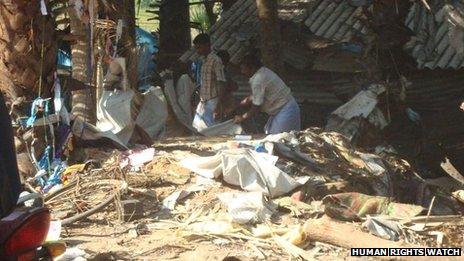Canada fury at Sri Lanka choice for Commonwealth talks
- Published
- comments

Canada is "appalled" that Sri Lanka has been chosen to host the Commonwealth heads of government meeting in November, its foreign minister says.
John Baird said Sri Lanka had failed in the fundamental Commonwealth values of "freedom, democracy, human rights, the rule of law and good governance".
Sri Lanka dismissed Canada's objections, saying Commonwealth members had agreed the summit could go ahead.
Sri Lanka's army defeated Tamil rebels after a brutal 26-year war in 2009.
John Baird: "We don't think Sri Lanka should be hosting the Commonwealth"
The entire conflict left at least 100,000 people dead.
Both sides were accused of human rights abuses throughout the conflict, with much focus on what happened in its final stages, when thousands of civilians were trapped in a thin strip of land in the north of Sri Lanka as fighting raged around them.
Estimates of civilian deaths in the final months range widely from 9,000 to 75,000.
'Disruptive elements'
Mr Baird told the BBC's Newshour: "Canada finds it appalling that the government in Colombo would be given the honour and the privilege and responsibility of hosting Commonwealth leaders.
"The Commonwealth has fundamental values of freedom, democracy, human rights, the rule of law, good governance and the government in Colombo has failed in all of those respects."
He said there had been "little, if any, accountability since the war ended".
Mr Baird said: "We've seen no meaningful attempt at reconciliation with the Tamil population. If anything it's getting worse."
He also said there was "a growing authoritarian trend" in Sri Lanka's governance, adding: "These are all fundamentally at odds with Commonwealth values and we don't think Sri Lanka should be hosting the Commonwealth."
Sri Lanka rejected Canada's criticism.
Sri Lankan cabinet spokesman Keheliya Rambukwella: "We feel they are very biased and very unfair."
Responding to the foreign minister's comments, Sri Lankan cabinet spokesman and Mass Media and Information Minister Keheliya Rambukwella told the BBC: "We have dealt with this human rights issue and we feel they are very biased and very unfair."
Foreign ministry spokesman Rodney Perera told Agence France-Presse news agency: "Canada can say anything, but the others agree with the [Commonwealth] secretary-general that the summit can go ahead in Sri Lanka. We are working on the arrangements."
Secretary-General Kamalesh Sharma said that Sri Lanka had been discussed at a meeting in London on Friday but added: "No member of government has indicated remotely that it wishes to change the venue."
Sri Lanka's state-run Daily News said "disruptive elements" had tried to remove Colombo as hosts with "trumped up charges of human rights abuses", adding: "Obviously, this move did not succeed."
Last month the UN's Human Rights Council passed a resolution highly critical of Sri Lanka's record.
The resolution encouraged Sri Lanka to conduct an independent and credible investigation into alleged war crimes.
The Sri Lankan government commissioned its own investigation into the war in 2011.
Its Lessons Learnt and Reconciliation Commission (LLRC) cleared the military of allegations that it had deliberately attacked civilians. It said that there had been some violations by troops, although only at an individual level.